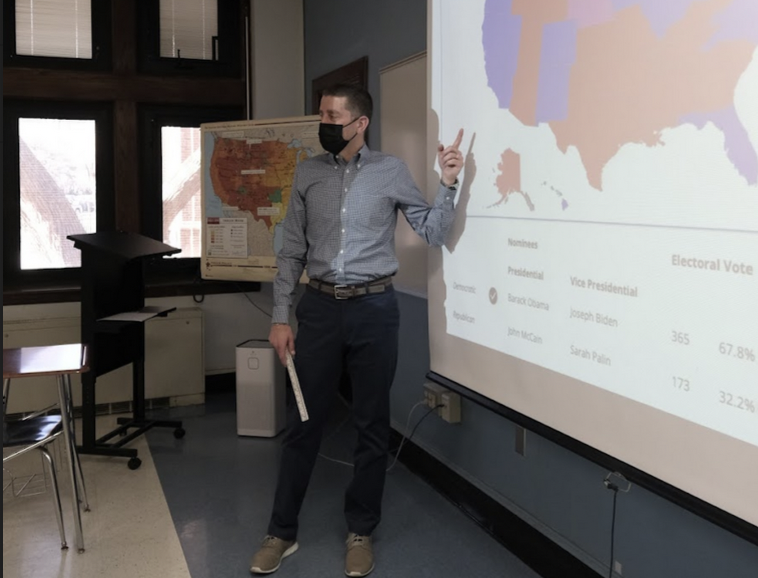PHS Profile: Timothy Campbell promotes activism among students
February, 2022
Photo: Emily Quian
Growing up, Timothy Campbell always knew he had a passion for politics and history. From engaging high school history classes to family Thanksgiving dinner conversations centered around politics, Campbell was drawn to the open and interpretive nature of the two fields. Now, as a history teacher at PHS, Campbell has led meaningful discussions about American history and contemporary events for 16 years.
Before coming to Princeton, Campbell was born and raised in Michigan, where he studied at Central Michigan University. With two teachers for parents, Campbell had always seen himself becoming a teacher in his own future. In college, Campbell tried to pursue his interest in political science as much as possible, majoring in secondary education with a focus on constitutional law and political science. By senior year, Campbell was amongst a select class of around 100 other interns at the White House.“I did a lot of correspondence, letter writing, setting up of meetings with potential appointees, and ... logistics of the correspondence,” said Campbell. “I had the best job because I had pretty much daily access and interaction with the President of the United States.”Following his internship, Campbell explored many different applications of his major, such as consulting and local campaigning. But he soon felt burnt out and realized he wanted to reignite his original passions in teaching.At the recommendation of a colleague, Campbell taught at Villa Victoria Academy, an all-girls private Catholic school, for three years. After researching New Jersey school districts more, Campbell came across PHS and was drawn to students’ drive for academic success. Campbell has always placed an emphasis on student growth and broadening perspectives rather than numerical grades. His classes are discussion-based, aimed toward encouraging open conversations on topics that may be difficult or controversial. Campbell believes this style of learning gives his students a safe place to discuss, especially if there are differing opinions.
“You don’t learn anything from just talking about or listening to opinions that are your own ... nobody ever died from listening. The worst thing that ever happens is that it solidifies your faith and your conviction in your own belief system ... [and] that’s a win-win,” said Campbell. “Silencing discourse, or not listening to [it], in addition to silencing people that you disagree with, [makes you] no better than the people that you disagree with. Campbell believes it is even more important to create such an environment given the turbulent political climate the country has been facing.“I’ve always been a firm believer in the idea that the most difficult conversations in life are all usually the most important,” said Campbell. “I understand [that]... in a school setting, [there is] an unwillingness or a level of discomfort, to have those difficult conversations in class whether it’s Black Lives Matter, abortion, guns, whatever it may be, but those are the important ones.”
Expanding on this, Campbell also believes that his students are in a place in their lives where conversation about these issues is uniquely important. “Having discourse and providing a place for young adults to start to talk about and think openly about these issues is important [because] come the next election, they’re going to have the opportunity to affect some sort of change,” Campbell said. Nicholas Matese ’24, a student in AP United States History with Campbell belives that Campbell’s efforts to include everyone in class discussions have been beneficial for students.“I like the fact that he makes sure everyone who wants to speak is able to speak,” said Matese.Campbell’s students also appreciate efforts to teach uncomfortable topics and tie them back to real life examples. “Especially in government and politics, there’s a lot more relevance to current events. ... The issues that he discusses with our Constitution are really being challenged every day in the political sphere,” said William Erickson ’22, who had Campbell for AP United States History and currently takes AP Government and Politics.To incorporate current event topics and introduce these difficult topics, Campbell goes beyond the textbook, using podcasts, documentaries, YouTube videos, and articles. He believes these mediums not only supplement his lessons, but also allow him to fill informational and educational gaps from the textbook.
Campbell recognizes COVID-19 as a major setback in the past two years since it prevented his favorite part of teaching—his daily interactions with his students. However, Campbell never lets them affect his goal and objective as a teacher. “There are always going to be frustrations in public education, but ... [I never lose] sight of the fact that the students that are sitting in front of [me] are the most important constituency that [I] serve. Nothing will ever cloud that,” Campbell said.
Outside of the classroom, Campbell is an avid sports fan who loves running as well as playing golf and hockey. On top of that, he also enjoys spending time with his children and often acts as their “taxi driver,” taking them to their many sports events. Campbell’s intended takeaway for his students is to pay attention to the world and to embrace their unique opinions. “I don’t care who they vote for. I would never do that. But just that [they] have a voice. And in this world where a lot of voices are silenced... you have a way of promoting change yourself,” said Campbell. “So that’s my biggest priority... that when they leave here, they go out into the world and they exercise that voice.”